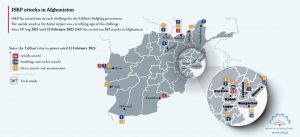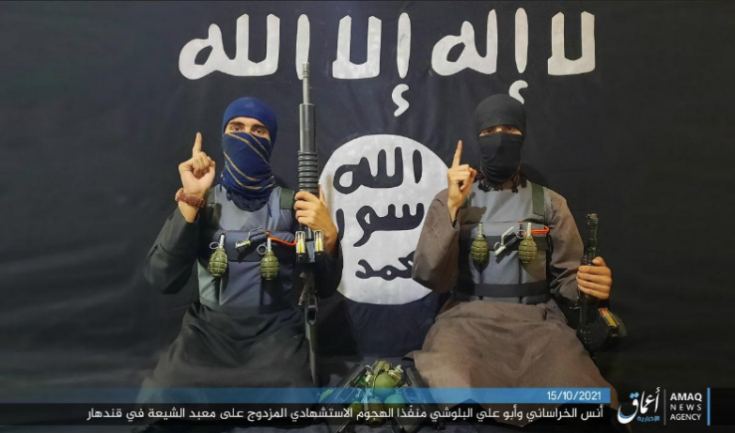While testifying to the Senate Armed Services Committee on Thursday, the Commander of the United States Central Command (CENTCOM), Army Gen. Michael Kurilla, warned that Islamic State militants in Afghanistan will be able to conduct external attacks against the West within six months.
Kurilla was specifically referring to the Islamic State- Khorasan Province, also known as ISIS-K or ISKP, telling Senators that “it is my commanders’ estimate that they can do an external operation against U.S. or Western interests abroad in under six months with little-to-no warning.” Kurilla’s assessment echoed statements made last week by chief of the Defense Intelligence Agency, Lieutenant General Scott Berrier, who also warned that “It’s a matter of time before they may have the ability and intent to attack the West.” Kurilla did note, however, that attacks by ISKP against the American Homeland would be “much harder” than attacking western interests in Europe or Asia.
????The Pentagon released findings of its probe of the Kabul airport suicide bombing in August that killed 170 Afghan civilians and 13 US service members.
? body cam clips of the explosion: pic.twitter.com/1ISEGkit7e
— The Rage X (@theragex) February 4, 2022
ISKP was responsible for the August 26, 2021, suicide bombing that targeted evacuation efforts at the Hamid Karzai International Airport in Kabul. The bombing, carried out by ISKP militant Abdul Rahman Al Logari, targeted a crowded canal along a security fence near Abbey Gate as scores of civilians tried to make their way into the airport. The blast killed 13 American service members and 170 civilians. Over 150 others were wounded in the blast, including other American troops. American intelligence was aware of an ISKP bombing plot targeting evacuation efforts in the days leading up to the attack. Last week, Marine Sgt. Vargas-Andrews, who lost an arm and a leg in the attack, testified to the House Foreign Affairs Committee that he had possibly identified the bomber before the attack, but was told not to engage because “leadership did not have the engagement authority for us.”
The terrorist group was formed in 2015 from dissident leaders of the Pakistani Taliban, known as Tehrik-i-T-ban (TTP). TTP militant Hafiz Saeed Khan was the group’s first Emir, with former Afghan Taliban leader Abdul Rauf Aliza being chosen as second in command. The move by the greater ISIS terror group to create ISKP came amid tensions between fractured TTP factions over the political and religious direction of the group. An intense propaganda campaign by ISIS and several meetings with TTP leaders ultimately lead to the formation of the group and its allegiance to Abu Bakr al-Baghdadi.

From there, ISKP actively sought to recruit former members of the Taliban who believed the group was not hardline enough in its Islamic beliefs, ultimately establishing a presence in Nangarhar province, Afghanistan. Attempts to recruit Taliban members and take over Taliban controlled areas of Afghanistan quickly led to ISKP and the Afghan Taliban declaring war against each other, where they have been fighting since.
While having relatively smaller numbers (estimates of 2,500 members) and a largely decentralized leadership now that the self proclaimed Caliphate has fallen in Iraq and Syria, ISKP cells have mainly been responsible for most bombing attacks against Kabul for several years, such as dozens of magnetic IED attacks against police, government, and human rights figures. ISKP has also been responsible for dozens of attacks against ethnic minority groups in Afghanistan, such as the May 2021 bombings against the Hazara Sayed al-Shuhada girls school, which left 90 dead and 250 wounded, most of which were young children. Over the past 18 months, ISKP has launched at least 13 major attacks against the Hazara community, killing and injuring over 700 people, according to the United Nations.
#Afghanistan ??: #ISKP (#ISIS – #Khorasan Province) released a video of their shooting attack on a #Taliban official in #Herat.
The ISKP militant apparently used a common 7.62x39mm AKS-47 / AKMS (underfolding) pattern assault rifle to carry out the attack. pic.twitter.com/eYYj7C7LRX
— War Noir (@war_noir) March 10, 2023
Since the takeover of Afghanistan, the Taliban have struggled to combat the growing threat ISKP poses to regional security. ISKP militants have continued to carry out frequent attacks against Taliban security forces and civilian Shia minorities through targeted assassinations, mass shooting attacks, and bombings. More recently, ISKP has begun to launch more daring attacks targeting Pakistani diplomatic staff and Chinese nationals. Since western withdrawal from the country, United States intelligence capabilities for the region have degraded significantly, according to Kurilla, who also noted that the ability to carry out counter terrorism operations against ISKP in Afghanistan have become more difficult. ISKP will continue to resurge in Afghanistan as the Taliban fails to counter their growth, with Kurilla calling the group’s ideology “uncontained and unconstrained.”


